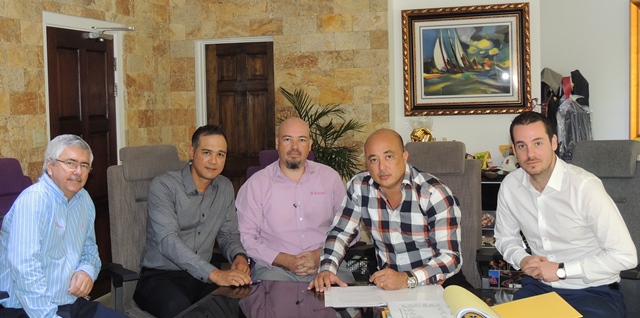
~ Third party contracts to be screened as per Recommendations of Ernest & Young ~
PORT ST. MAARTEN – During the March 3rd Second Edition of “Day of the Supervisory Board,” in Aruba, the VanEps Kunneman VanDoorne sponsored presentation focused on risk management. During the presentation, it was pointed out that risk management was gaining attention within corporate governance.
In the latter quarter of 2016, the first meeting of Port St. Maarten’s Enterprise Risk Assessment (ERA) Committee took place. The Executive Management of the Port has taken a proactive approach to implement a more disciplined risk management process in line with its corporate governance policies.
Ernst & Young (EY) Advisory Services was contracted in the first quarter of 2016 to carry out the study which was submitted to management in September 2016, and implementation priorities have been executed as of January 2017 by the Port’s ERA Committee to ensure proper work ethic and performance.
Destination Sint Maarten is one of the world’s leading cruise destinations. The cargo operations of Port St. Maarten are rapidly becoming a port of choice for regional transshipment. Port St. Maarten comprises of 13 companies that are responsible for most of the country’s island maritime activities which can be summarized in four pillars, namely, Cruise, Cargo, Yachting and Real Estate.
Based on Port St. Maarten’s responsibilities and critical role in maritime matters, EY Advisory Services was contracted to carry out an Enterprise Risk Assessment which took place between January to May 2016. EY is a global leader in assurance, tax, transaction and advisory services.
Port St. Maarten Management understands the importance of the ERA based on global security and safety trends and developments which it keeps abreast of and follows keenly via attendance of conferences and workshops throughout the year and via meetings with cruise and cargo partners.
All major businesses globally are taking more stringent stances and are paying much needed attention to ensuring that their infrastructure and the use of their infrastructure, and the works being commissioned and carried out by third parties at their infrastructure, follows a certain standard in other words a due diligence process . At the end of day screening procedures must incorporate efficiency and effectiveness criteria.
The ERA Committee members are Roger Lawrence (Chairman), Bertrand Peters, and Hans Hootsmans, who will work independently from the Management Team in carrying out their tasks as a committee. One of the objectives is to restructure and improve the contractual part of third parties doing business at the Port. There first tasks as risk owner is to review all third parties compliance at the port including mandatory screening and background checks.
Port St. Maarten Management will be provided with enhanced capabilities to assess risks across the organization and make informed decisions regarding the organization’s key business risks.
The Port engaged EY to conduct an ERA throughout its organization. The focus of this ERA was to identify and understand the Port’s key business risks and develop and agree on an appropriate risk criteria to be used in assessing and prioritizing the company’s key business risks.
Based on the identification and assessment of the Port’s key business risks and taking into account the effectiveness of management and control activities, the Port’s residual risk profile has been developed. The residual risk profile enables the Port to develop its risk response strategy, based on the organization’s risk appetite, in order to effectively manage the risk profile.
The ERA Committee will review and impose compliance of third parties with the Port’s policies and procedures, also standardization must be done with all works both contractual and non-contractual work. Concessionaire management with concessionaire control/review, new agreements include clause enforcing compliance with International Ship and Port Facility Security Code (ISPS) and all Port St. Maarten policies. Due diligence is to be performed with a mandatory to review tenants and/or concessionaires/third parties.
The ERA is the process of planning, organizing, leading, and controlling the activities of an organization in order to minimize the effects of risk on an organization’s capital and earnings.
Enterprise risk management expands the process to include not just risks associated with accidental losses, but also financial, strategic, operational, and other risks. Delays in strategic investments are also part of this process.





























